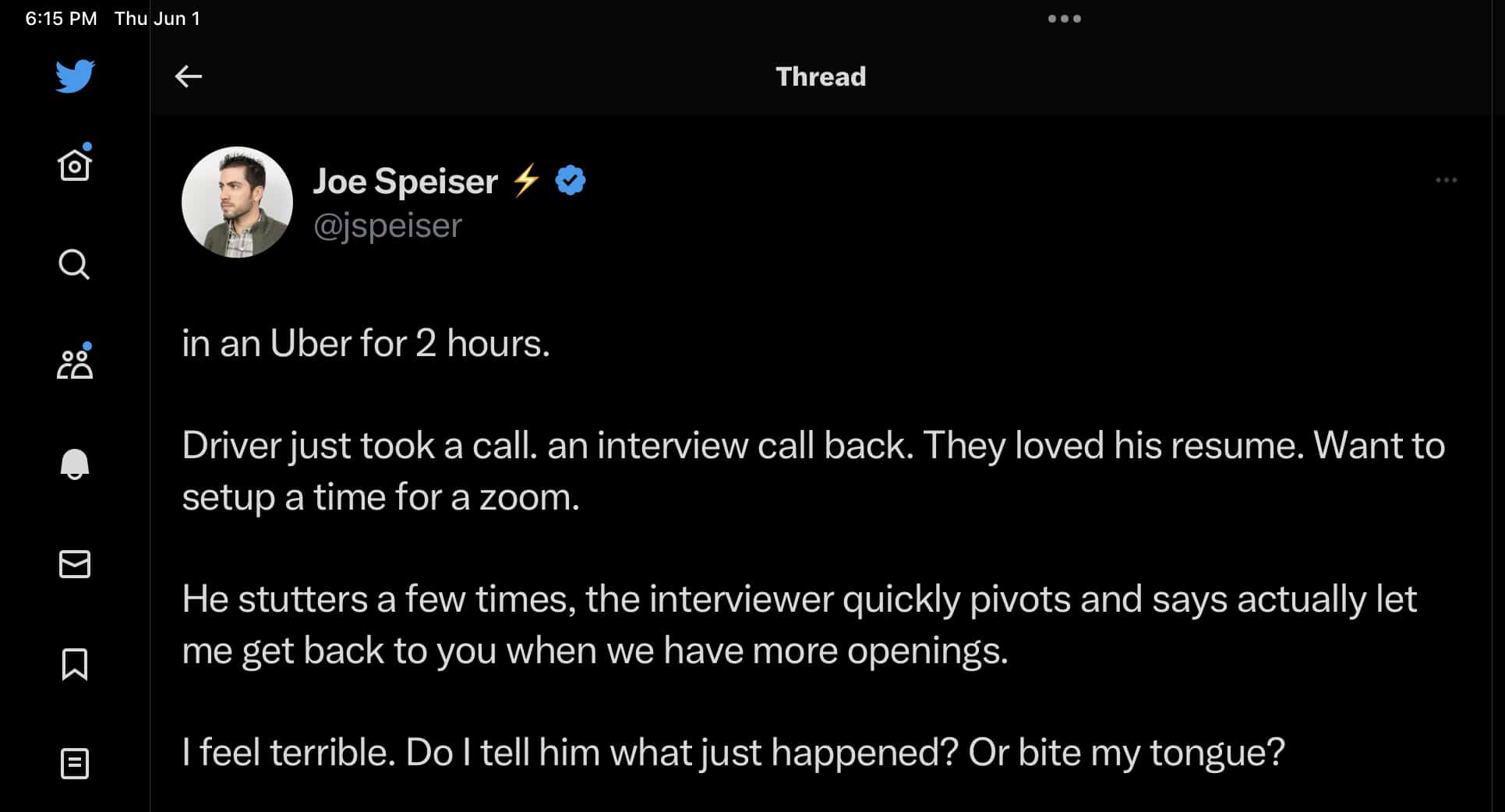Introduction: The transformative power of empathy
In a world that often values success and achievements over human connection, it’s easy to overlook the power of empathy. But what if a simple act of empathy, a genuine understanding of someone else’s experience, could change lives?
Drawing inspiration from a thought-provoking tweet shared by Joe Speiser, @jsspeiser, we explore a real-life story that highlights the impact of offering feedback from a place of empathy.

Table of contents
Estimated reading time: 4 minutes
The transformative power of empathy
I read a tweet by @jsspeiser today that struck a chord with me. Joe tells the story of an Uber driver who experienced a disappointing job interview call. As I read through the thread, it got me thinking about the importance of empathy and the impact it can have on our interactions with others. In this blog post, I want to delve deeper into the power of empathy, the difference between sympathy and empathy, and how offering feedback from a place of empathy can truly change lives.
Empathy vs. Sympathy: Understanding the difference
When we encounter someone facing a challenging situation, we often offer sympathy. We say things like, “That sucks,” or “I’m sorry to hear that.” While sympathy is well-intentioned, it doesn’t go beyond acknowledging the pain. It stops there. Empathy, on the other hand, takes it a step further. It asks us to put ourselves in someone else’s shoes, to truly understand their experience and perspective.
Here’s How The Story Unfolds:
In the tweet, Joe shares an encounter with an Uber driver who stutters during a job interview call. The interviewer quickly pivots and says they’ll get back to him when there are more openings. It’s evident that the driver’s stutter played a role in the call being cut short, leading to disappointment and potential embarrassment.
Empathy in Action
Now, let’s imagine ourselves in the driver’s shoes. He’s an immigrant with a heavy accent and a stutter. It’s likely that he’s familiar with situations where his stutter/accent has affected his interactions. This particular instance may not be an isolated incident for him.
But Joe said that the driver thanked him for his feedback and said that no one had ever had the courage to tell him what he suspected.
This is where empathy comes into play. It prompts us to ask ourselves, “What would I want if I were in his shoes?” Joe, being a well-connected and compassionate individual, sees a potential solution to mitigate the consequences of the driver’s stutter. He musters the courage to offer feedback, but not from a place of criticism.
The Power of Feedback
Joe asks the driver a simple question, “Hey man, would you like some feedback?”
He understands that speech therapy, although beneficial, might not be easily accessible for everyone but he knows that it could change the guy’s future. In addition to the suggestion of speech therapy, he proposes a potential platform like Upwork with text-based conversations that could help bridge the communication gap.
Joe’s intention is not to fix the driver or impose his own solutions. He genuinely wants to offer support and open doors for the driver’s growth.
The Impact of Empathy
Here’s what’s beautiful about this story: the driver could have responded with anger or rejection. But empathy changes everything. It created a connection, letting the driver know that someone truly sees and cares about him. It’s not about misery loves company; it’s about offering a glimmer of hope, a chance to change his trajectory in life.
The driver had wondered if his speech delivery was what was holding him back and he seemed grateful for the feedback.

The Bottom Line: Offering feedback doesn’t require the other person to take our advice
Empathy is a powerful tool that we can all cultivate in our interactions. The next time you encounter someone who could benefit from your perspective or feedback, approach it with empathy.
Put yourself in their shoes and genuinely ask, “What would I want if I were in their situation?” By offering feedback from a place of empathy, you have the potential to change lives and make a lasting impact.
Maybe not for everyone but at least for the ones who are open and receptive to hearing it.
Let’s build an Empire of Empathy, one feedback encounter at a time.
Leave a Reply